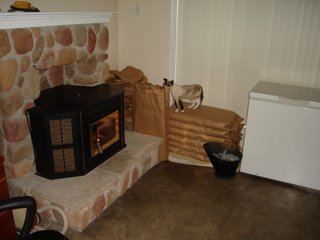I’ve chosen to supplement the heat from my natural gas furnace with heat from a corn-burning stove. I chose corn because it’s clean, and is easy to transport and store. Corn-burning stoves are efficient, safe, and easy to use. To determine how profitable heating with corn is, I carefully monitor my corn use, and compare natural gas heating costs to that of last year. Since the heating season is half over, I can now do the math.
All things considered, I’ve already saved $250.00. By the end of this heating season I will have saved $400.00 to $500.00, and I will have burned 3600 lbs of corn. The work involved in burning corn can be summarized as follows:
- Purchasing, transporting, and storing corn.
- Retrieving it and filling the stove’s hopper.
- Cleaning the stove and lighting the fires.
These tasks take no more than 15 minutes per 50 lb bag of corn, or a total of 18 hours for the entire heating season. If I were paying myself to do these chores using the money I’m saving by burning corn, I would have earned almost $28.00 per hour. And, although the price of corn has gone up recently, I’ll maintain this hourly rate by streamlining my corn-handling chores.
These numbers may surprise some people. You don’t have to wait for the price of other home heating fuels to increase in order to save money. You can save money now, and probably save a great deal more in the future. My calculations were the result of substituting corn for natural gas, but your savings will be even greater if you’re currently using a more expensive heating fuel. Additionally, you’ll become more carbon-neutral by burning corn, which is beneficial to the planet. This is truly a win-win situation.

Casper inspects the corn. No mice found this time.
For more information about burning corn, visit: http://www.iburncorn.com/
John








No comments:
Post a Comment